Report Overview
The average ESG disclosure score for the solar microgrids industry is between 60% and 70%. Our proprietary ESG scoring framework analyzed 65 parameters across environment, social, and governance pillars, as represented in our methodology. Siemens Aktiengesellschaft, Eaton Corporation plc and six more market leaders were part of our research. Only five of the profiled companies scored above the average industry ESG score, with the top three companies scoring well above the industry average score across the E, S, and G pillars. Of the three laggards identified in our research, two companies have an overall disclosure score below 60%, while one company scores below 40%, needing to focus on improving its social disclosure.
All the companies profiled in this solar microgrids market have significant scope for improvement across their social performance. Our research confirms that the majority of sustainability-related disclosures have been made around governance metrics, with an average disclosure score of 81%, followed by disclosure around environmental metrics.
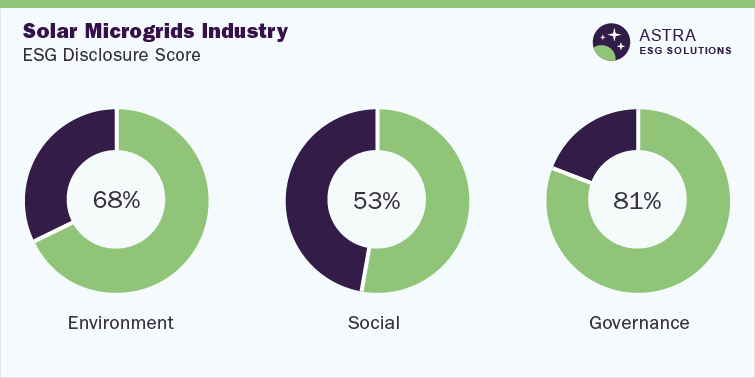
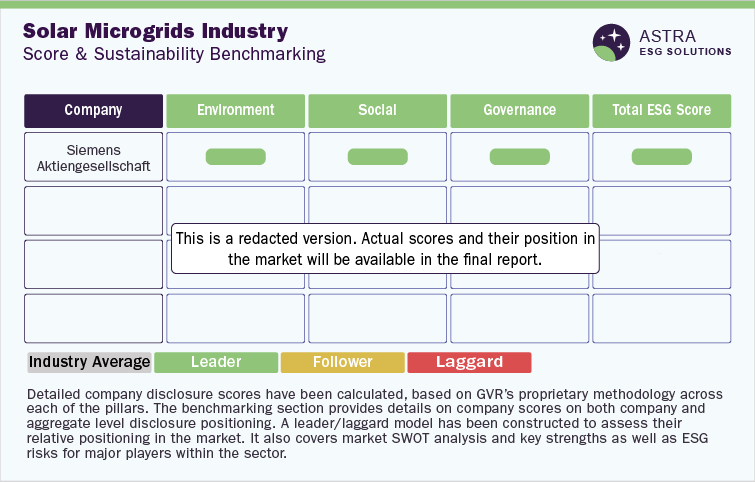
Environmental Insights
A solar microgrid is a small-scale, decentralized energy system that combines solar power generation with energy storage and management capabilities. By providing a source of clean electricity, solar microgrids help reduce the carbon footprint and promote energy security by reducing dependence on fossil fuels. They also promote energy security in the areas that previously depended on unreliable grids.
According to our research, companies in the solar microgrids market have depicted accurate disclosures on their GHG emissions, allowing investors to make better decisions. More than 50% of the profiled companies in the solar microgrids industry, including ABB Ltd. and TotalEnergies SE, have achieved a “Leader status” in our disclosure score in environmental benchmarking.
More than 80% of the companies in the industry have waste management programs in place, making it one of the strengths of the industry. Yet, only four companies have disclosed their waste-related targets, including Lockheed Martin Corporation, ABB Ltd and Eaton Corporation plc.
Around 80% of the industry leaders follow the Task Force on Climate-Related Financial Disclosures framework (TCFD), which allows the stakeholders to gain a comprehensive overview of climate-related risks. Furthermore, 75% of profiled companies have gained ISO 14001 certification, which reflects their commitment to efficient use of resources.
However, disclosures regarding environmental expenditure and targets for the use of renewable energy in the operations are classified as some of the environmental threats in the solar microgrids industry as almost none of the leaders have given weightage to these two disclosures.
With respect to environmental benchmarking, the following chart compares the scope 1 and scope 2 emissions along with the emission intensity of the top three companies in this category:-
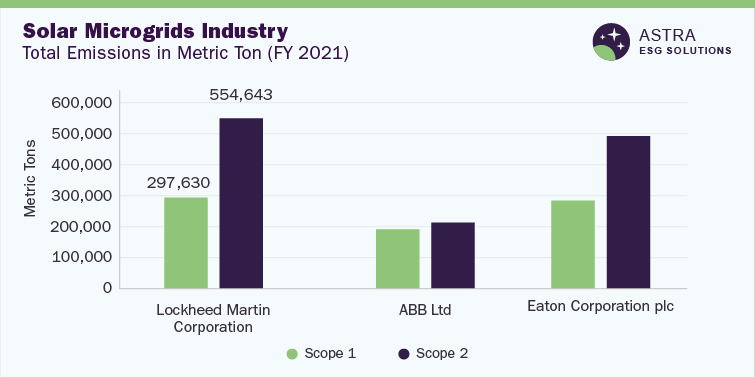
Social Insights
Social metric assesses a variety of risks and opportunities surrounding the human capital and the community within which a company operates. This includes employees, stakeholders and their relationship with them. Employees and safety parameters covering OHSAS certifications and injury rates, alongside employee training and development, employee engagement programs, privacy, supply chain transparency, and human rights, are majorly included in this category.
With a social disclosure score of 80%, Siemens Aktiengesellschaft ranks the highest amongst all the profiled companies in the social pillar. All the profiled companies, including the top three companies in the social pillar,have disclosed the total injury rate in their operations across three years. This allows companies in the microgrids industry to take appropriate measures to take care of their workers and improve workplace conditions.
Research also suggests that all firms in the solar microgrids industry have integrated human rights within their supply chain, which is one of the significant social metrics assessed s in the industry. Hence, the integration of human rights policies across the supply chain of each firm has been another KPI that is given significant consideration.
More than 60% of the firms in the industry have quantified targets to improve workforce diversity. However, the gender pay gap also requires improved disclosure levels in the industry, as out of the total profiled companies, only one company has disclosed information regarding this KPI, which has shown a drastic increase in the gap in 2021 as compared to previous years. The lack of disclosure regarding the gender pay gap might affect the credibility of a firm in terms of being an equal opportunity provider.
Under social benchmarking, the following chart provides a brief comparison on the employee turnover rate and injury rate among the top three companies in this category: -
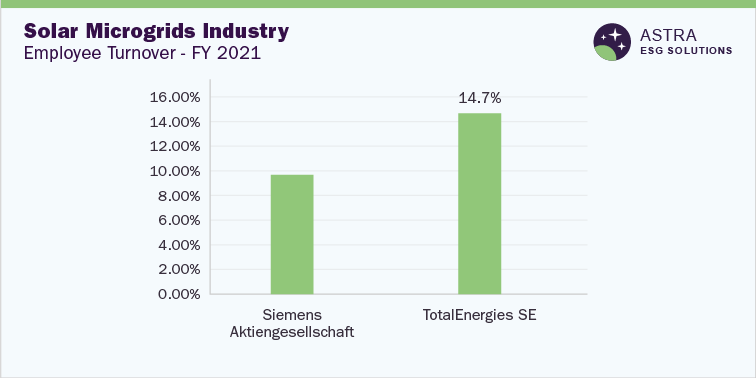
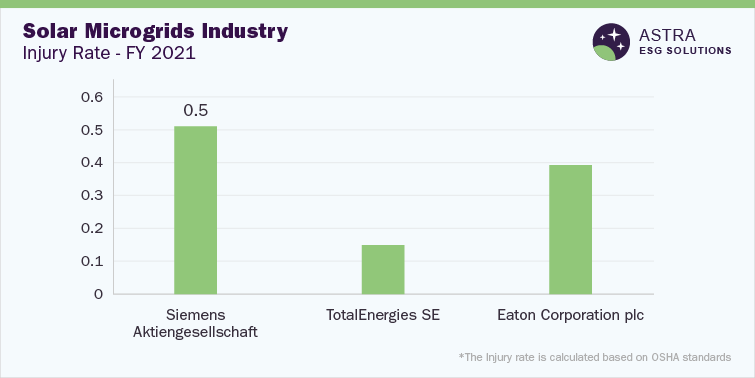
Governance Insights
Corporate governance practices are core to an organization, as understanding opportunities and risks in governance is critical for decision-making. Governance is one of ESG’s core components as it assesses the purpose of a corporation, the role of directors, the make-up of directors that includes female representation and independence of the board of directors, equity, and compensation of boards.
Independent directors on the board play a crucial role in improving governance standards and corporate credibility. Siemens Aktiengesellschaft, ABB Ltd, and PG&E Corporation are the top three companies leading on the governance metrics. Out of the three, Siemens reported the highest percentage of women on its board for the year 2021, while ABB recorded the lowest of the three companies in the governance pillar.
Cybersecurity is one of the major KPIs alongside board diversity that are areas of opportunity for companies in the solar microgrids industry according to our research. 75% of the companies in the sector have a cybersecurity program and all eight companies have a female member on board. However, the average women representation on board among the companies in the industry is below 40%. Out of the top three companies, only ABB Ltd has not disclosed any information about cybersecurity measures, while PG&E lags in disclosing business continuity plans out of the top three.
In terms of board independence, all companies in the industry have independent directors on board. ABB Ltd tops the list with the highest percentage (with 100%) of independent directors. However, PG&E Corporation has to improve the representation of independent directors. Clawback policies are also one of the strengths in the governance metrics disclosures; as much as 80% of the profiled companies in the market leaders have published their clawback policies. Apart from these governance metrics, more than 90% of the companies have institutionalized a variable remuneration system (for executives) that is associated with the achievement of certain sustainability goals. Furthermore, all firms in this industry have a dedicated supplier code of conduct. However, despite having a published supplier code of conduct, only 50% of the profiled companies in the solar microgrids market have disclosed conducting corruption audits for the suppliers.
With respect to governance benchmarking, the following chart provides a brief comparison regarding female representation on board among three companies: -
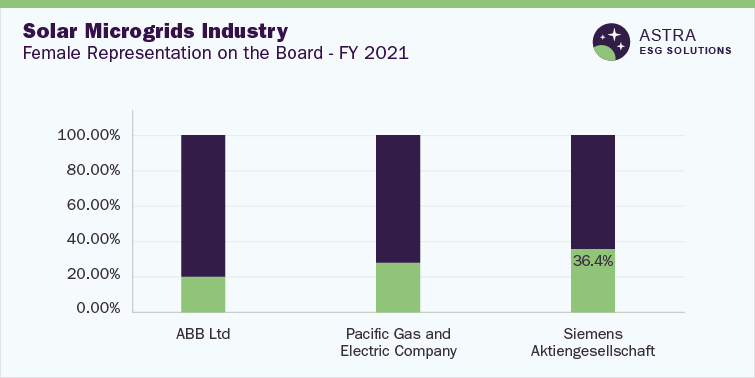
Country-level Insights
On a global scale, the top countries in the solar microgrids market are China, the U.S., Japan, Germany and India. China is considered as the largest solar power generator. As of 2020, there were more than 50,000 installed solar photovoltaics with a consolidated capacity of 306.65 GWs installed domestically in the country. Following China, the U.S. had 461 operational microgrids installed across the country, providing around 3 GW of electricity as of 2021. Of these, the energy of around 70 microgrid systems is sourced from solar energy.
In 2021, Japan generated approximately 86 terawatt hours of electricity from solar power, which is the largest source of renewable energy in the country. At a prefecture-level in Japan, several projects related to solar energy and solar microgrids have come up in the past three years. Following Japan, Germany generated 50,000 GWh of solar power generated from 2.2 million photovoltaic generation sites in 2021. In the same year, the country added 5.3 GW of electricity sourced from solar power to fuel its electricity supply.
Market Overview
According to Grand View Research, the global microgrids market was estimated at USD 76.88 billion in 2023 and is forecasted to expand with a compound annual growth rate of 17.1% from 2024 to 2030. Rising power demand across the globe, especially from countries such as China, Mexico, India, and Russia, has resulted in the growth of the market across the household settings and industrial sectors.
Product-wise, the grid-connected product segment dominated the global market and accounted for more than 65% of the overall revenue share in 2023. This can be attributed to innovations in the solar microgrids industry, such as smart micro grid-connected PV systems for providing electricity without transmission losses.
The popularity of distributed energy sources such as energy storage systems and solar panels has increased due to their positive influence on the environment in terms of reducing carbon footprint) by reducing the reliance on traditional energy sources. Overall, commercial applications dominate the demand for these products in the market due to their extensive power requirements in retail outlets, hospital settings, and schools for ensuring Heating, Ventilation and Air Conditioning (HVAC) operations and lighting operations, among others.


